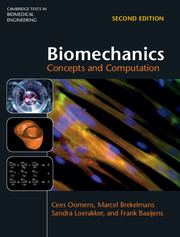Book contents
- Frontmatter
- Contents
- About the Cover
- Preface to the First Edition
- Preface to the Second Edition
- 1 Vector and Tensor Calculus
- 2 The Concepts of Force and Moment
- 3 Static Equilibrium
- 4 The Mechanical Behaviour of Fibres
- 5 Fibres: Time-Dependent Behaviour
- 6 Analysis of a One-Dimensional Continuous Elastic Medium
- 7 Biological Materials and Continuum Mechanics
- 8 Stress in Three-Dimensional Continuous Media
- 9 Motion: Time as an Extra Dimension
- 10 Deformation and Rotation, Deformation Rate and Spin
- 11 Local Balance of Mass, Momentum and Energy
- 12 Constitutive Modelling of Solids and Fluids
- 13 Solution Strategies for Solid and Fluid Mechanics Problems
- 14 Solution of the One-Dimensional Diffusion Equation by Means of the Finite Element Method
- 15 Solution of the One-Dimensional Convection–Diffusion Equation by Means of the Finite Element Method
- 16 Solution of the Three-Dimensional Convection–Diffusion Equation by Means of the Finite Element Method
- 17 Shape Functions and Numerical Integration
- 18 Infinitesimal Strain Elasticity Problems
- References
- Index
13 - Solution Strategies for Solid and Fluid Mechanics Problems
Published online by Cambridge University Press: 02 February 2018
- Frontmatter
- Contents
- About the Cover
- Preface to the First Edition
- Preface to the Second Edition
- 1 Vector and Tensor Calculus
- 2 The Concepts of Force and Moment
- 3 Static Equilibrium
- 4 The Mechanical Behaviour of Fibres
- 5 Fibres: Time-Dependent Behaviour
- 6 Analysis of a One-Dimensional Continuous Elastic Medium
- 7 Biological Materials and Continuum Mechanics
- 8 Stress in Three-Dimensional Continuous Media
- 9 Motion: Time as an Extra Dimension
- 10 Deformation and Rotation, Deformation Rate and Spin
- 11 Local Balance of Mass, Momentum and Energy
- 12 Constitutive Modelling of Solids and Fluids
- 13 Solution Strategies for Solid and Fluid Mechanics Problems
- 14 Solution of the One-Dimensional Diffusion Equation by Means of the Finite Element Method
- 15 Solution of the One-Dimensional Convection–Diffusion Equation by Means of the Finite Element Method
- 16 Solution of the Three-Dimensional Convection–Diffusion Equation by Means of the Finite Element Method
- 17 Shape Functions and Numerical Integration
- 18 Infinitesimal Strain Elasticity Problems
- References
- Index
Summary
Introduction
The goal of the present chapter is to describe a procedure to formally determine solutions for solid mechanics problems, fluid mechanics problems and problems with filtration and diffusion. Mechanical problems in biomechanics can be very diverse, and most problems are so complex that it is impossible to derive analytical solutions and often very complicated to determine numerical solutions. Fortunately, in most cases it is not necessary to describe all phenomena related to the problem in full detail; simplifying assumptions can be made, thus reducing the complexity of the set of equations that have to be solved. The present chapter deals with formulating problems and solution strategies, starting from the most general set of equations and gradually reducing the generality by imposing simplifying assumptions. In Section 13.2 this will be done for solids. Section 13.3 is devoted to the solution of fluid mechanics problems. The last section of this chapter discusses diffusion and filtration.
Solution Strategies for Deforming Solids
In this section, it is assumed that the material (or material fraction) to be considered can be modelled as a deforming solid continuum. This implies that it is possible and significant to define a reference configuration or reference state. With respect to the reference state, the displacement field as a function of time supplies a full description of the deformation process to which the continuum is subjected (at least under the restrictions given in previous chapters, such as a constant temperature). After all, for a displacement field that is known as a function of time, it is possible to directly calculate the local deformation history (applying the kinematics: see Chapter 10) and subsequently, the stress state as a function of time (using the constitutive equations: see Chapter 12). The relevant fields, from a mechanical point of view, that are obtained in this way for the continuum have to satisfy the balance equations (see Chapter 11). In addition, the initial conditions have to be fulfilled: at the beginning of the process, the positions of the material points in space have to be prescribed, usually in accordance with the reference configuration, and also the initial velocities of the material points have to be in agreement with the specification of the initial state.
- Type
- Chapter
- Information
- BiomechanicsConcepts and Computation, pp. 270 - 291Publisher: Cambridge University PressPrint publication year: 2018



